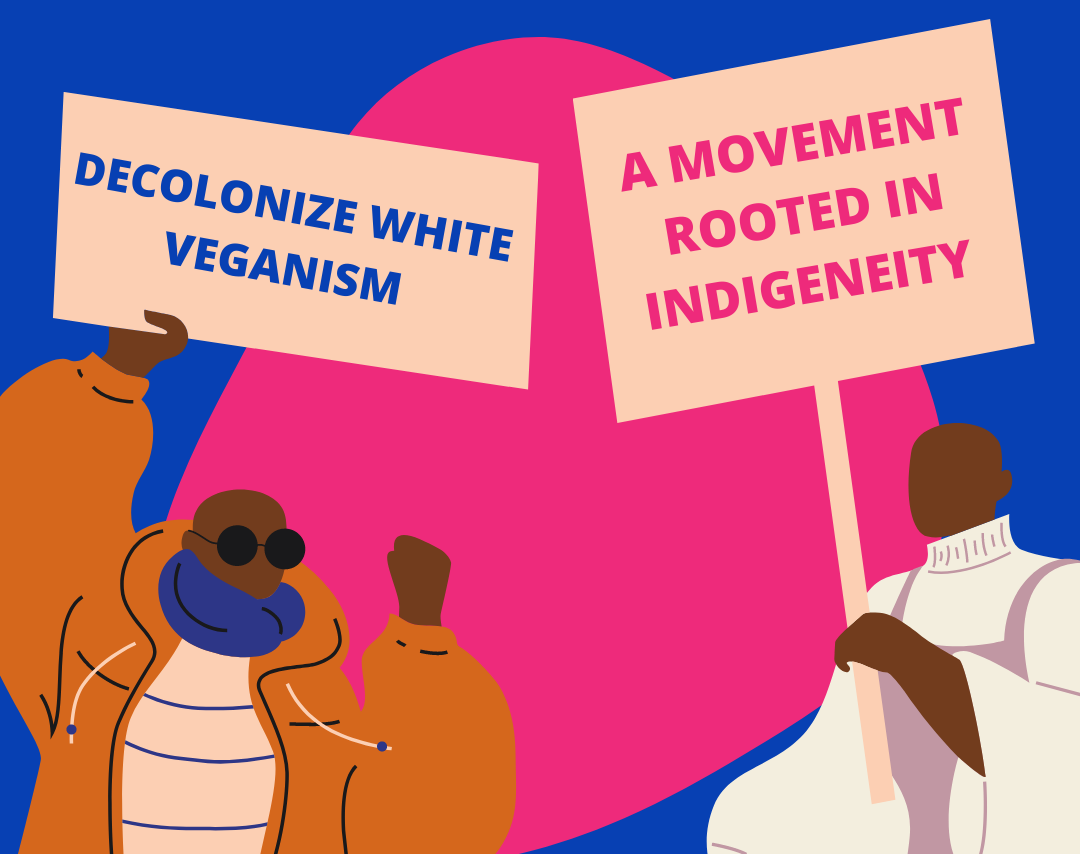It’s Time We Decolonized White Veganism
By Raphael Miller
Veganism, as it exists today, is a rapidly growing, earth-saving movement despite having been primarily recognized as a fringe lifestyle until recent times. The movement continues to grow in popularity as it lends itself to animal rights and environmentalism, as well as the world’s meat and dairy industries - industries that contribute to 80% of annual US air-pollution deaths related to the food industry. On the surface, veganism outwardly appears as a movement of empathy and compassion. The movement, however, reflects different realities of white supremacy, lack of accessibility, visibility, and colonialism to both vegan and non-vegan BIPOC alike. Whatever the motivation, the intention of veganism falls short when the product induces direct harm upon some of our most marginalized populations.
This mainstream version of veganism, referred to as white veganism, maintains a white and affluent overarching context. This one-sided narrative exists for several reasons; as a movement known for centering its white, wealthy, skinny, cisgender, able-bodied poster children, the presence of inherent racism and exploitation comes at no surprise.
Modern-day white veganism is a movement rooted in environmentalism and physical health, but it continuously fails to show up for the intersecting issues that fall within these categories. The problems facing the movement are rarely acknowledged, with issues ranging from accessibility, Indigenous sovereignty and rights, big business/capitalism, racism, and human rights themselves. Of the vegans I know or follow on social media, the ones that I find to openly advocate against these issues are specifically Black, Indigenous, or a Person of Color (BIPOC). They are the vegans who hardly, if ever, gain any sort of recognition for being vegan - or worse, are told they could not possibly be vegan due to the cultural connotations of their perceived ethnicity.
Despite the fact that globally, BIPOC experience the most negative impacts of climate change, they are continuously left out of the conversation. Whether they’re vegan or not, to be environmentally woke is not something that is often associated with BIPOC and rather falls to white shoulders. Similar connotations surround BIPOC and veganism as a whole despite the fact that BIPOC are some of the largest advocates for environmental justice, as well as of the fastest growing populations of vegans. The reason why such erasure exists within these movements lies among notions of white supremacy and systemic oppression.
This lack of representation within the white vegan movement has partially to do with a general lack of visibility within the white vegan movement; that is, visibility outside of the occasional tokenization of BIPOC individuals and groups. The reality is that populations of BIPOC vegans continue to grow despite their erasure, with Black vegans growing the fastest. In fact, Black Americans are almost 3 times as likely to become vegan compared to any other American. This is in part due to the benefits upon one’s physical health, but is also attributed to the strong sense of empowerment that many experience while being both Black and vegan.
Systems of oppression and racial injustice contribute to poor diets of many Black people, as well as those living in low-income areas. This makes Black veganism a form of resistance, as they push back against oppressive structures made to keep their bodies and minds unhealthy. Becoming vegan or vegetarian while being Black also becomes empowering through the acknowledgement of the plant-based nature of many African and afro-Caribbean cuisines. While not strictly vegan in many cases, there is a sense of closeness felt to one’s ancestors through pursuit of these lifestyle choices - an ancestral closeness that has been withheld from Black people for far too long. It is important to always remember that there is power in food and nutrition, as systems of oppression exist at all levels to disempower marginalized communities.
This lack of BIPOC visibility within white veganism also has much to do with accessibility within the movement. Many lower-income neighborhoods found in larger cities primarily consist of BIPOC residents, which already makes the costly nature of veganism difficult to attain. These lower-income neighborhoods are also known for the food insecurities commonly found within these areas, also known as ‘food deserts’ or ‘food swamps’. Residents of areas affected by food deserts routinely find themselves without enough to eat or with poor nutritional options, as healthy sources of food remain either miles away or with a hefty price tag. This is also a common theme throughout Native reservations, where food sources are not only thin, but also where Native shoppers spend $7.51 more on the same basket of food found at a local supermarket. These food deserts continue to come with a higher price as large businesses benefit from BIPOC consumption as they undermine their health.
The roots of veganism are far from white or Euro-centric, yet BIPOC erasure from the conversation has become normal. For BIPOC, a common reason that they become vegan is to feel a closeness to their ancestors, as well as to experience a connection to certain cultural values; still, this often becomes overshadowed by the white vegan narrative. Cultures that reside outside of the Euro-centric sphere become disregarded or condemned, for at the core of white veganism exists a tendency for white saviorhood and sense of self-righteousness - both being products of white supremacy. This leaves the links between veganism, Indigeneity, Blackness, and intersectional activism hardly, if ever, acknowledged. Instead, these sentiments surrounding white supremacy urge many white vegans to condemn any consumption of meat or animal products, period, no matter the potential cultural or spiritual motives for not being vegan.
It is common to see white vegans impose what they deem as best for the world upon cultures in which they have no context, nor right to be speaking on. The imposition of the personal choice of veganism on Black, Indigenous, and People of Color is a form of cultural colonialism, as hunting practices and consumption of meat is necessary for many cultures. However, to be a white vegan is to value the lives of nonhuman animals over everyone else, with emphasis on particular marginalized groups that don't fit into their white narrative.
It is no secret that within the white vegan movement comparisons are often made between the lives and struggles of humans and that of animals. The dairy and meat industries have often been compared to sexual assault, which in itself becomes problematic for its comparisons between survivors and animals or meat. These comparison serve as a direct slap in the face to the vulnerable populations of undocumented workers working in these industries. In particular, undocumented workers without papers or visas are at risk for sexual harrassment and assault within agricultural industries for fear of deportation. Yet, when we think about our associations between sexual assault and the meat or dairy industries, many of us jump to the same white vegan rhetoric regarding the rape and assault of animals in these industries. Why is this? Because like a 5th grade history class, whiteness, and all that is deemed problematic by said whiteness, holds the narrative. Within this white narrative, it does not matter if there are Brown undocumented workers who are in the actual face of these violent realities. To the white vegan movement, these workers are contributing to the harm that these industries perpetuate upon animals, meaning their lives and experiences are now somehow invalidated.
Another popular, more racially-charged white vegan rhetoric is that of comparing veganism to the civil rights movement or animal liberation to chattel slavery. Through these narratives, the lives and struggles of Black people become equal to that of animals. This imagery is not only triggering for Black people, but dangerous. These comparisons desensitize the use and perception behind the historical connotations regarding ‘slavery’ and ‘civil rights’ - plights exclusive to Black people, meaning that white people and non-Black People of Color have no place to provide new contexts to these terms. When Black people are still fighting to be viewed as equal - as human, even - in a society that uses similar comparisons to nonhuman animals to justify their systematic and systemic murder, jailing, and mistreatment, such comparisons are overtly harmful.
Even though the white vegan movement focuses primarily on the industrial and inhumane natures of the meat and dairy industries, a large part of their platform also includes hunting. For many white vegans, any form of hunting practice becomes condemnable, including that of Indigenous American tradition. Within white veganism, this is the point where their ideas of issues plaguing Indigeneity and all that they intend to fight for/against stop; the movement does not maintain any platform in actual service of Indigenous Americans. Instead, through the routine policing of Indigenous practices and people, white vegans walk in the footsteps of their colonizer ancestors.
Many white vegans do not acknowledge that the pre-colonial existence of domesticated animals raised for pure consumption was rare within Indigenous communities; for them, the concept of an animal-human binary didn’t even exist, but this reality has been twisted. The willful misconstruing nature of settler colonialism has continuously perpetuated a ‘savage’ or ‘barbaric’ Indigenous rhetoric. In reality, nonhuman animals exist as equitable partners to humans within a vast, complex interconnected network within Indigenous framework, a sentiment that heavily resonates with the core veganism.
In particular, the Mi'kmaq, an Indigenous Nation traditionally occupying the Northeastern woodlands (the eastern Maritime Canadian provinces and parts of U.S. states Maine and Massachusetts), have a strong emphasis on not taking more than you need, meaning not killing more animals than you need to survive. These same traditions also include the honoring of animals that they consume through utilization of every piece of the animal, letting nothing go to waste. This sentiment also coincides with the ‘consent’ of said animal to be hunted.
While killing animals is far from vegan, the Mi’kmaq, along with many other Indigenous Nations, hold ideas that strongly align with veganism. This includes an overall respect for animals and the environment; Indigenous beliefs strongly regard animals and their environment as ‘someone’ and not through the lens of Western objectivity. When one dives into the correlations between Indigeneity and veganism, it is almost uncanny. It also serves as reasoning as to why Indigenous people may turn to veganism in order to feel a closeness with their ancestors and culture. The colonizer-imposed narrative of savagery and abuse remains far from the truth, but we have a long way to go before we can say we’ve fully decolonized the narrative.
This entire anti-Indigenous and anti-Black, white-centric narrative can be pinpointed to the failure of white vegans to recognize the stem of the issues surrounding animal and environmental welfare. Rather than addressing institutions and practices that were put in place by their very own colonizer ancestors - that of capitalism and mass production - many white vegans instead opt for ‘green capitalism’, fueling large corporations for being ‘eco-friendly’; the environment will never be saved by institutions guided by mass production and consumption.
Instead, we have to make conscious efforts to guide ourselves away from the very things that started and continually perpetuate these global issues - capitalism and colonialism; to not acknowledge the root of these problems is to be ignorant of the only solution, as well as what ensures an entire resolution. This can only be accomplished through the advocacy and return of land back to Indigenous peoples. Until then, environmentalism and animal welfare will always be an issue, for there is no room for ecological reform without decolonization.
The primary issue with consuming meat is not the consumption itself, but the industry behind it, and the capitalist nature of the movement that comes with the direct harm of BIPOC. It is not the ancient hunting practices of Indigenous Americans that is ruining the environment and harming animals, it’s issues similar to the deforestation of the Brazilian Amazon in order to cultivate massive amounts of soybeans, all spearheaded by large, money-hungry corporations but ‘vegan’ nonetheless.
To spare the feelings of white vegans is dangerous to Black, Indigenous, and People of Color everywhere. For this reason, writing this post is not just dire, but an entirely necessary act as a person of color conintuously striving to grow more conscious and critical of the capitalistic, white supremacist society that we all inhabit. There needs to be a line drawn between conscious-minded, anti-colonial veganism and the predatory, capitalistic nature of white veganism, a movement perpetuated and initiated by hundreds of years of white euro-centric settler colonialism. For this reason the veganism at the end of my critique has been solely referred to as it is - white veganism, not the veganism that many Black, Indigenous, and People of Color undertake to experience a conscious closeness to their ancestors and their native homelands.
Many white vegans will take it as a personal attack to merely have the word “white” in front of a movement that makes up a portion of their identities, claiming color blindness or flat out disregard, for they are ‘one of the good ones’, but this is where I ask that these same white vegans continue reading this post anyway. Chances are, if you’re vegan, you want to be a good person or help in the perpetuance of goodness to some degree. If this rings true, here’s an opportunity to become more conscious-minded and open to the struggles incited by white veganism through pure acknowledgement of these issues.
If you decide that as a white person who is vegan that this post still does not apply to you, I implore you to ask yourself if you actually want to be a good person or if you just want to be perceived as a good person. I would ask you to re-examine your ideas of righteousness and who exactly it is that you are saving by advocating for animals but not for the issues surrounding Black, Indigenous, and People of Color in this post.
The term veganism didn’t even exist until 1944 but it’s roots go far deeper. Despite it’s modern-day white and affluent connotations, said roots are far from white, capitalistic, or colonial. Veganism is rooted in ancient Dharmic tradition throughout western Asia, including followers of Buddhism, Hinduism, Sikhism, and Jainism. The idea of veganism is particularly rooted in Jainism, an ancient Indian religion whose religious practices include a rigorous strictly vegetarian diet, as well as Buddhism. Indian philosophers and emperors adhered to a diet based on nonviolence, otherwise known as ahiṃsā. This sentiment included not only humans, but animals as well. The belief that all living things contain a divine spark is what inspires this notion of ahiṃsā.
Despite the ancient, non-white roots of veganism, when one thinks of veganism as it exists today, we immediately go to the white narrative. Many white vegans consider the movement to have been started as a Western, fringe, pro animal-rights movement and do not hold, nor acknowledge, the ancient Indian philosophers who were quite literally thousands of years ahead of the curve.
It is impossible to preach about saving the earth without first caring for the lives who make your righteous white veganism possible; one cannot serve the environment if fellow human beings are coming second to these issues. BIPOC and the impoverished bear the largest brunt of these issues, not affluent white vegans. These issues are not separate, but all intertwined - racism, colonialism, white supremacy, Indigenous sovereignty, environmentalism, and animal welfare. You cannot confront one issue without acknowledging the others, which is one of the biggest issues that plague white veganism - the blinders within the movement regarding everything but the environment and animal welfare. It is time we removed them and made conscious efforts to confront the dangerous nature of white veganism, and instead move toward a more conscious-minded decolonized version of the veganism that we need.


